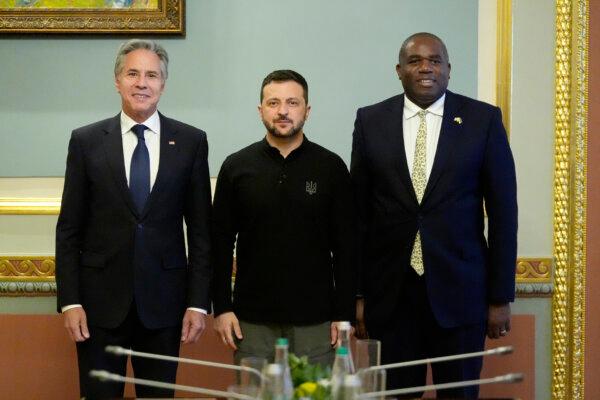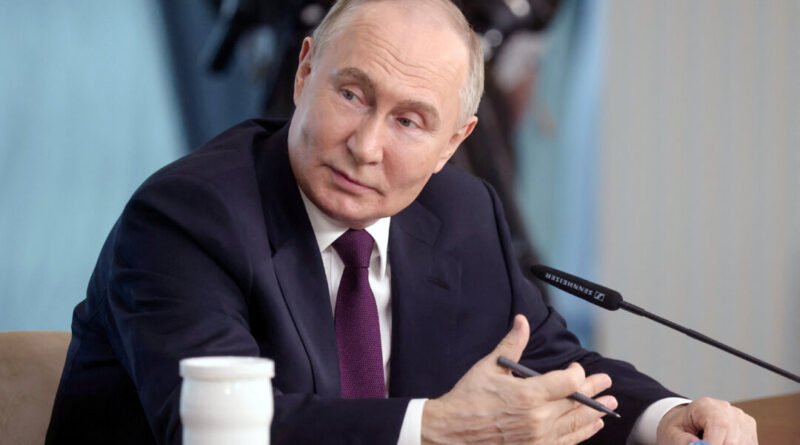Putin Warns NATO Against Allowing Long-Range Missiles, Saying It Would Be Considered Direct Involvement in War
Putin stated that Ukraine would need to depend on U.S. and European allies for satellite targeting data and programming the flight paths of the missiles.
During an interview on Sept. 12, Russian President Vladimir Putin emphasized that if NATO were to permit Ukraine to launch long-range missiles provided by Western nations into Russia, it would constitute direct involvement in the conflict and fundamentally change its nature.
Putin addressed Russian state television, saying, “If this decision is made, it will signify nothing but the direct participation of NATO countries, the United States, and European nations in the conflict in Ukraine. This would mark their direct involvement, and undoubtedly alter the very essence, the very character of the conflict.”
He further mentioned that Ukraine, lacking the necessary military intelligence capabilities, would have to rely on satellite data and missile programming assistance from U.S. and European partners.
“Therefore, the issue is not about allowing the Ukrainian government to launch these weapons at Russia or not,” Putin explained. “It is about determining whether or not NATO countries are directly engaged in a military conflict.”
Putin also stated that Russia would make “appropriate decisions in response to the threats posed to us.”
His remarks followed the meeting between U.S. Secretary of State Antony Blinken, British Foreign Minister David Lammy, and President Volodymyr Zelenskyy in Ukraine to discuss ongoing military support for Kyiv.
Following the meeting with Zelenskyy, Blinken mentioned in a press conference that the military needs and capabilities of Ukraine were discussed.
“The main topic we covered was military capability and reinforcement—such as air defense, F-16s, ammunition, drones, armored vehicles, and other equipment—everything that can contribute to achieving victory,” he explained.
Blinken reassured that the United States would adjust its support to Ukraine as necessary.
“Speaking on behalf of the United States, we have continuously adapted and adjusted as the needs and conditions on the battlefield have changed, and I am confident that we will continue to do so as the situation evolves,” Blinken assured. “The bottom line is this: we want Ukraine to succeed, and we are fully committed to providing the support required for its courageous defenders and citizens to achieve that goal.”
During the press conference in Ukraine, Lammy highlighted what he described as a recent “significant and dangerous escalation” in the Russia-Ukraine conflict, citing the transportation of Iranian drones, missiles, and munitions to Russia.

U.S. Secretary of State Antony Blinken (L) and Britain’s Foreign Secretary David Lammy (R) meet with Ukraine’s President Volodymyr Zelenskyy at the Mariinsky Palace in Kyiv, Ukraine, on Sept. 11, 2024. Mark Schiefelbein/Pool via AP Photo
“The escalator here is Putin,” Lammy remarked.
British Prime Minister Keir Starmer echoed similar sentiments on Sept. 12 while en route to Washington to meet with President Joe Biden regarding Ukraine’s potential use of British-made Storm Shadow cruise missiles on Russian territory.
“Russia initiated this conflict,” Starmer informed reporters while aboard his flight. “Russia unlawfully invaded Ukraine. Russia has the power to end this conflict immediately.”

U.S. Army Tactical Missile System (ATACMS) fires a missile into the sea during a missile drill in East Coast, South Korea, on July 29, 2017. South Korean Defense Ministry via Getty Images
Describing the Fath-360 system with a maximum range of 75 miles, Blinken warned that dozens of Russian military personnel trained in Iran could use these missiles against Ukrainians within weeks.
Iran’s foreign ministry denied reports of supplying ballistic missiles to Russia, as reported by the semi-official ISNA news agency.
Ministry spokesman Nasser Kanaani dismissed the claims, labeling them as “ugly propaganda and lies” aimed at misleading the public about the transfer of Iranian arms.
Kremlin spokesman Dmitry Peskov, speaking to reporters on Sept. 9, hailed Tehran as an “important partner” for Moscow.
“Iran is our important partner, and we are enhancing our trade and economic relations, cooperation, and dialogue in all areas, including the most sensitive ones,” Peskov stated.
Caden Pearson, The Associated Press, and Reuters contributed to this report.





